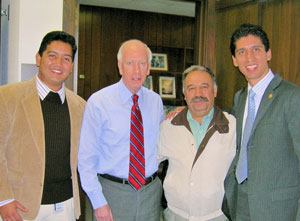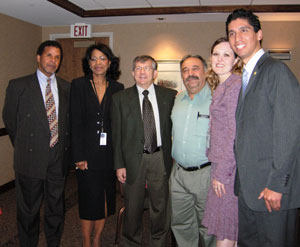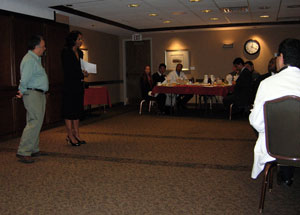 |
John Gollan, M.D., Ph.D., dean of UNMC’s College of Medicine, second from left, greets Jose Alejandro Almaguer Gonzalez, M.D., director of traditional and intercultural development for the Secretary of Health in Mexico City, Enrique Lopez Reyes of Omaha’s Mexican Consulate and Armando De Alba Rosales, a UNMC medical student from Xalapa Vera Cruz, Mexico. |
Dr. Almaguer, second from right, greets from left, John Stone, M.D., Ph.D., professor, Creighton University Medical Center; Jose Cuevas, Mexican Consulate; David Grandison, M.D., Ph.D., director of UNMC’s Center for Reducing Health Disparities; Rubens Pamies, M.D., vice chancellor for academic affairs; and Jay Noren, M.D., dean, College of Public Health. |
 |
From left: David Grandison, M.D., Ph.D., director UNMC’s Center for Reducing Health Disparities; Aura Whitney-Jackson, UNMC South Omaha community liaison; and David Crouse, Ph.D., associate vice chancellor for academic affairs; greet Jose Alejandro Almaguer Gonzalez, M.D., director of traditional medicine and intercultural development for the Secretary of Health in Mexico City, along with Susan Davis of the UNMC Center for Continuing Education, and Enrique Lopez Reyes from the Mexican Consulate. |
 |
UNMC faculty, staff and members of the community listen as Aura Whitney-Jackson, UNMC South Omaha community liaison, translates for Jose Alejandro Almaguer Gonzalez, M.D., director of traditional medicine and intercultural development for the Secretary of Health in Mexico City. |
Speaking through an interpreter, he said when health care professionals ask patients about their symptoms, they should also ask about their life and the stressors that could contribute to their pain or disease. In his culture, health care providers are very concerned about the mind, body and spirit connection. It is a holistic approach to disease management and treatment.
When touring UNMC’s pharmacy, Dr. Almaguer said he noticed a big difference. In his native Mexico, a pharmacy in is divided into two — one side stocks prescription medicine, the other side stocks herbs, teas and other cultural healing remedies.
Many people from Latin America, Mayan, Indian, Chinese and African cultures use herbs, acupuncture and massage as part of their standard care. In the United States, such methods are considered complementary medicine.
Dr. Almaguer said having a basic understanding of various cultural treatments can help patients and doctors work together towards appropriate care. He encouraged academic health science centers to incorporate herbal remedy information into the curriculum.
David Crouse, Ph.D., associate vice chancellor for academic affairs, said that the herbal industry is largely unregulated and the topic is not covered in depth in UNMC curricula. Nonetheless, complementary and alternative medicine remains an area of interest and concern for many physicians.
“There’s no question that some aspects of complementary medicine can be effective, but many still need to be evaluated in rigorous clinical trials,” Dr. Crouse said. “Indeed, many of our common drugs like aspirin and several heart medications came from traditional medicine origins.”
“I’m a believer in its potential value,” said David Grandison, M.D., Ph.D., director of UNMC’s Center for Reducing Health Disparities. “There is proven benefit in some types of complementary medicines, however for most there are key questions of safety and efficacy that require further evaluation. The NIH’s Center for Complementary and Alternative Medicine is currently trying to help answer these questions through well-designed scientific studies. Since many patients use complementary medicines, it is important to have an understanding of it to better advice patients of risks and benefits.”
Health care professionals should become aware of cultural practices and how they affect patient understanding of health care management and treatment, Dr. Grandison said.
While modern science and traditional/complementary medicine view disease and treatment differently, Dr. Almaguer said the recent dialogue between health professionals is the best place to start bridging the gap.